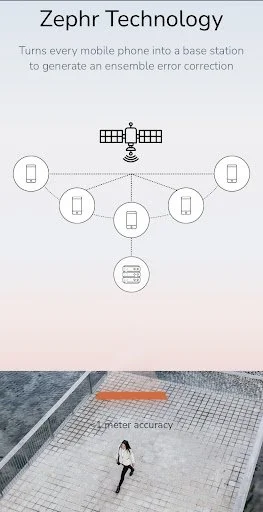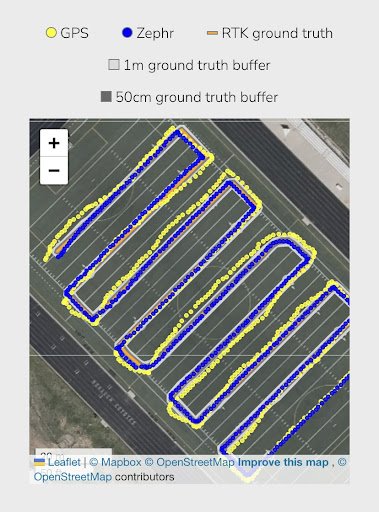Zephr: The Company that Wants to Blow Up GPS
Today I want to talk about tiny technological improvements and why they don’t matter. But then I want to talk about… why I have no idea what matters. And how sometimes, you just have to have faith..
So I recently saw that Zephr has raised $3.5M in Seed Funding, and did some cursory research. They’re a geodata company with some interesting product goals, and I decided to take a deeper look.
But then when I tried to return to Zephyr, one of the first challenges I encountered was…finding the company. Part of the problem was that there are more than 25 companies named Zephyr listed in Crunchbase
“No one will be able to find our website, but Z is my favorite letter, so I’m going for it.”
And that’s when I realized the company is spelled “Zephr” without a Y. Thankfully they’re not building a consumer-facing product, otherwise the SEO horror alone may have been enough to kill it for me.
But this is not an app where Googleability makes or breaks the business. Instead Zephr offers a niche improvement on a technical feature. But they argue that marginal edge will be enough to change the way we use…everything.
But can they do it?
Zephr: And a Future Where GPS Actually Works
You know when you get out of the Subway or get dropped off by an Uber, and you start walking to your destination, but then realize the GPS was drunk and you just walked 2 blocks in the wrong direction?
Basically, Zephr is trying to fix that.
Their “next generation GPS” product is a software solution that allows devices like phones to sync up with each other as well as satellites to provide higher fidelity geolocation. At least that’s how I understand it.
Zephr claims (and research verifies) that current GPS options only provide accuracy of between 3 and 5 meters. Whereas Zephr technology supposedly gives accuracy of about 1 meter. They also say it protects data privacy and all that other good stuff we’re supposed to care about. Although who knows.
Maybe you care about companies tracking your location. But several billion dollar revenue streams would argue you care about hangover burritos delivered to your doorstep a whole lot more
The difference between 3m and 1m of fidelity might not seem like much. But Zephr argues that distinction means significant improvements in AR, gaming, autonomous devices, rideshare, delivery services, and other categories.
Their marketing also suggests that more than just increasing accuracy for existing services, providing that advanced level of granularity would enable whole new services, business, and innovations.
And maybe it would. Maybe.
Why I Don’t Buy It
I don’t have the exposure of technical ability to do deep diligence on how the tech works. But after looking through the website, I just. I don’t know if this thing is a game changer.
On their site, Zephr has a demonstration of their technology compared to standard GPS. And while the Zephr tech is better, the data isn’t quite the slam dunk they seem to think it is.
See above, for a Running Back executing the wildest route in football history
I see the improvement, and maybe it could unlock some big innovations.
But I feel like for most people, most of the time, GPS works pretty well. In fact it’s pretty magical when you think about it! Your phone knows where you are. Your car, your headphones, your watch. GPS already knows everything. So why do we need innovation when the current solution gets the job done?
I just can’t see this technology blowing up and fundamentally changing the geolocation industry.
Why I Would Invest Anyway
Longtime readers will know that I don’t always love the companies I review. Sometimes I dig in. I try to understand the product, the market, and the value proposition. But I just can’t understand what the venture investor sees in the company.
Zephr is not one of those companies.
I know the above discussion might have you thinking I don’t like this company. And it’s true, I don’t understand the technology well enough to see what it’s doing differently. I can’t tell if there’s a competitive moat. And I can’t tell if they’re really adding value.
But just because I don’t understand the tech, that doesn’t mean it doesn’t work.
And if there’s one reason I like the company, it’s this:
The executive team is excellent.
Particularly, I want to call your attention to the CEO, Sean Gorman.
Lots of startup execs say that have X number of years of experience. And of course everyone claims to be an expert on the vertical they’re building in. But look at this man’s resume.
“Invented the idea of location”,
Sean Gorman
Just since 2014, he’s founded 3 location/spatial data companies. And one of those (Timber.io) was successfully acquired. Before that he worked on various other projects for big names in the industry. He’s seen a lot, he’s learned a lot. This is exactly who you want starting a company.
And this is where I am forced to accept, I know nothing about how the GPS data business works. And Sean Gorman absolutely does. If there’s one person who knows whether a few meters of added fidelity makes a difference, this is the guy. More than that, he knows what it takes to build innovations that big companies are willing to pay for.
So if I’m a VC, and he walks in the door with a product he says solves a problem in the geodata space, I’m investing.
I know it’s a trope for VC’s not to know anything about tech. But when someone really knows what they’re talking about, sometimes it pays to trust them, and just hold on tight to see where the wild ride will take you.
Until next time. This has been,
The Weekly One Pager
———————-
P.S. - I know I missed a few weeks there. And I appreciate you guys sticking with me here. This isn’t my full time job (although maybe one day!). But it is a big commitment, and I remain fully committed to bringing you guys compelling thoughts and analysis (ideally) on a weekly basis. Even if life does sometime get in the way.
P.P.S - Even if I miss a few posts every now and again, I’m not gonna change the name of this thing. Although if you want to start calling it "The Mostly Weekly One Pager”, I won’t judge. Thank you for reading!








What will it take to change the global positioning system?